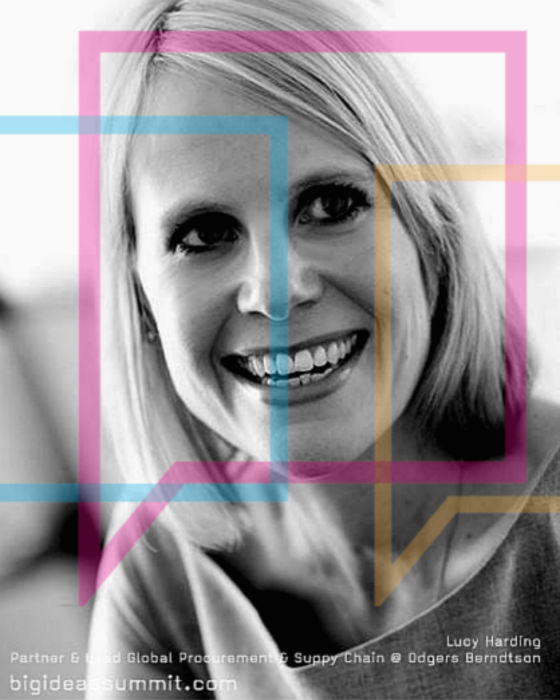Why Future CPOs Need to Walk the Talk
Procurement is changing and its leaders need to change to in order to succeed. Lucy Harding tells Procurious why it’s behaviours, more than technical skills, that will define future CPOs.
Lucy Harding, Partner at global executive search firm, Odgers Berndtson, is considered to be the UK’s leading CPO headhunter. She believes that for future CPOs, behaviours and business acumen will carry more weight in recruitment than technical skills.
Lucy’s involvement in Big Ideas is consistent with her view that future CPOs and leaders need to have the following key attributes:
- The ability to create a function that brings insight and innovation to an organisation
- Use of the best technology tools and trends to enable your team to be effective.
- Ability to access and excite emerging supply partners
- Ability to attract and retain the best talent – tuning in to the millennials motivations and creating roles that offer challenge and development
At the Big Ideas Summit 2016, Lucy will be taking part in a panel discussion, which will discuss attracting the top talent to procurement, and what skills will be required by future CPOs and other procurement leaders.
The thing I’m most looking forward to about the Big Ideas Summit is meeting new people that have interesting ideas on how to move the profession forward. It’s exciting to see the breadth of speakers and contributors that will be able to discuss emerging and future trends that the function needs to get to grips with.
What are the key differences between the skills required for executive level procurement, and the mid-level roles?
The difference between the skills needed at the mid-level and those required at an executive level are behavioural, rather than technical. This is the same for any functional leader (HR/Finance/IT) as they become the head of their function. Technical competence is a given. At senior levels, after a number of years in a function, everyone should be technically competent.
At the margin, the difference is leadership, broader business acumen, financial numeracy, and breadth of experience gained across a range of industries and geographies. To land the top role, an organisation will be looking at you not only with that role in mind, but what can you do next.
What would you say are, or will be, the key attributes of procurement leaders in the next 5 years?
- The ability to create a function that brings insight and innovation to an organisation
- Use of the best technology tools and trends to enable your team to be effective.
- Ability to access and excite emerging supply partners
- Ability to attract and retain the best talent – tuning in to the millennials motivations and creating roles that offer challenge and development
- The ability to structure your organisation that gives you the best access to global talent
- Someone who doesn’t talk procurement language to the business
- A combination of procurement and business skills
- Experience of living and working in emerging markets
Do you see any patterns or common issues when it comes to your executive searches?
Clients are increasingly keen to recruit “business leaders first, functional excellence second”. International experience, with a breadth of industry sector experience is also in high demand. Above all, the ability to engage with the business, and do what you say you are going to do, is critical.
This is becoming increasingly evident, since many of the searches I undertake have elevated the positioning of the role, and therefore visibility to the Board is heightened.
Procurious focuses a lot on the individual brand and social media presence of all procurement professionals. How important is this for recruitment in the profession?
Social Media is an increasingly important tool for recruitment. At the junior and middle management levels it’s often used for candidate identification so a well presented profile is vital to get “found”.
At the senior levels where Odgers Berndtson operates, whilst candidates may be found via sources such as LinkedIn, social media is a useful tool for candidates to use to research those they are going to meet during their interview process. As a senior leader looking to hire, it’s important that you use social media as an attraction tool about you as an individual leader that top talent would want to work with.
A word of caution also. All search firms and employers themselves will conduct online media checks on potential candidates, therefore it’s important to ensure that all information on line about you is suitable and professional.
Lucy Harding talk about these topics in more detail during one of our panel discussions at the Big Ideas Summit on April 21st.
If you’re interested in finding out more, visit www.bigideassummit.com, join our Procurious group, and Tweet your thoughts and Big Ideas to us using #BigIdeas2016.
Don’t miss out on this truly excellent event and the chance to participate in discussions that will shape the future of the procurement profession. Get Involved, register today.
